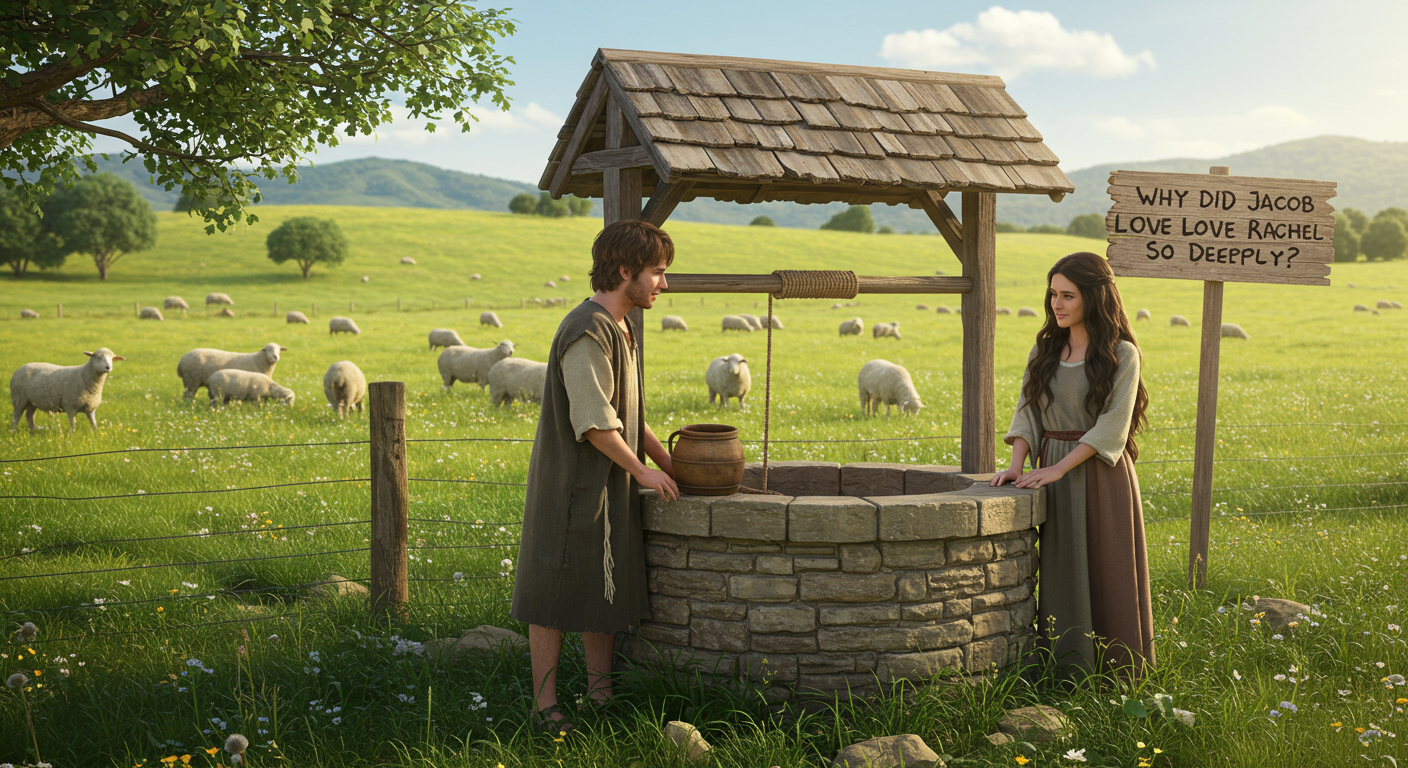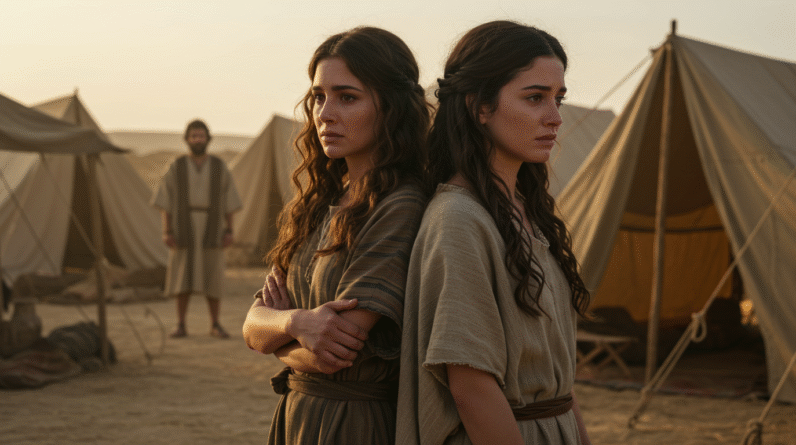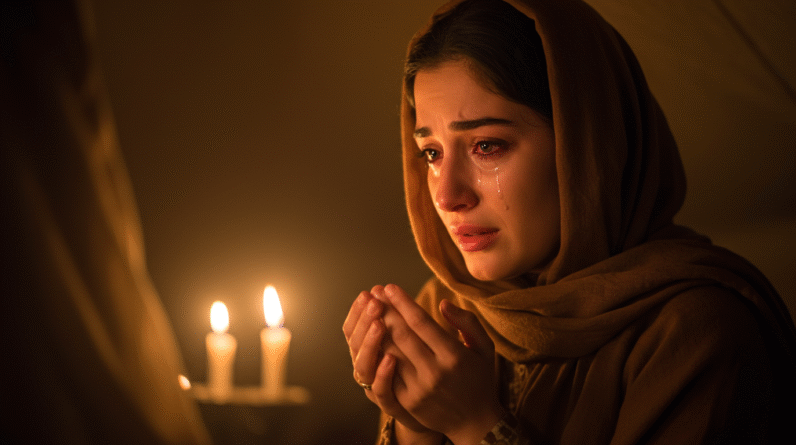Why Did Jacob Love Rachel So Deeply? A Biblical Look at Love and Devotion
Hey there! Have you ever found yourself wrapped in a story so profoundly human, yet woven with divine threads? The tale of Jacob and Rachel is one such narrative that captivates readers of the Bible, offering insights into the nature of love and devotion. But what made Jacob’s love for Rachel so deep and compelling? Let’s set off on an exploration of this love story, dissecting biblical passages and reflecting on the larger themes of love and sacrifice.
Jacob and Rachel: A Love That Endured Time
Before digging into the depths, let’s set the stage. Jacob and Rachel’s story is set in the Book of Genesis. Jacob, the son of Isaac and Rebekah, first sees Rachel at a well and is instantly smitten. It’s like love at first sight, but with ancient sacred undertones! This isn’t just an attraction; it’s as if destiny itself took the reins. Their meeting is detailed in Genesis 29:9-12, a passage which notes Jacob’s immediate affection.
Jacob’s love for Rachel wasn’t some fleeting infatuation. Instead, it was a consuming desire, an enduring commitment that led Jacob to work seven years under her father, Laban, to earn her hand in marriage. And when those seven years were up? Instead of receiving Rachel, Jacob was deceived into marrying her older sister, Leah. Yet, Jacob’s love was steadfast. He committed to another seven years of labor to marry Rachel, a testament to the profound loyalty that defined his passion.
The Intensity of Jacob’s Devotion
Jacob’s devotion manifested itself in ways that underscored the cultural and spiritual significance of his love. In a time when marriages were often seen as transactions or alliances, Jacob’s willingness to serve Laban for fourteen years is a saga of sacrificial love. Imagine dedicating a decade and a half of your life to the hope of being with your beloved! The endurance Jacob showed speaks volumes of a love that transcends ordinary boundaries.
A Love Beyond Circumstance
Think about it: Jacob’s life was fraught with hardship and deceit. Despite having been tricked into marrying Leah, Jacob never allowed bitterness to taint his affection for Rachel. This resilience in love is highlighted in Genesis 29:30, where Jacob loved Rachel more than Leah, continuing his service for her hand. His commitment exemplifies how authentic love is not swayed by unfavorable conditions but stands firm, still yearning and hopeful.
Love Rooted in Sacrifice
Is there any greater love than one that asks for personal sacrifice? Jacob’s story paints sacrifice not as a burden, but as an act of devotion. The Bible often uses the metaphor of love as sacrifice, foreshadowed here and realized in the New Testament narratives of Christ’s love for humanity. Jacob being willing to labor a total of 14 years speaks to a love that mirrors the greater scriptural principle: true love sacrifices.

Love in the Biblical Context
Jacob and Rachel’s love aligns beautifully with the broader biblical view of love. The Bible often presents love as a commitment, a decision rather than a mere feeling. In 1 Corinthians 13:4-7, love is described in terms of patience, kindness, truth, protection, trust, hope, and perseverance—virtues incredibly reflective of Jacob’s love for Rachel.
Love and Covenant
The notion of covenant is central to biblical theology, as God made covenants with Noah, Abraham, Moses, and David. Jacob’s love can be seen as a personal covenant with Rachel, rooted in loyalty and sustained by fidelity. Just as God’s covenants are unbreakable, Jacob’s agreement to Laban was not easily abandoned despite deceit and hardship. His unyielding pursuit of Rachel is an earthly reflection of divine promise and unending faithfulness.
Devotion as an Act of Faith
Jacob’s love also becomes a lens to examine how personal devotion is linked to faith. Jacob trusted not only in his feelings for Rachel but in a divine plan that accompanied his heart’s desire. His labor was not just for Rachel but a labor in faith—a belief that his dedication would bear fruit. In a way, it models how believers are encouraged to pursue their own lives of faith, fueled by hope and sustained by steadfast love.
Implications for Modern Relationships
So, you may wonder: what does Jacob and Rachel’s story mean for us today? While the cultural backdrop may be different, the core of their story still resonates. It challenges us to rethink love beyond instant gratification. Jacob’s example sets a standard of love that is patient and enduring, one that waits and preserves in the face of trials.
Relationships Rooted in Commitment
Jacob’s love narrative invites us to ground our relationships in commitment. This doesn’t mean ignoring reality for a fairytale ideal but emphasizes choosing love as an act of the will—even when circumstances are less than perfect. In times when modern relationships can easily succumb to superficiality and convenience, Jacob’s story strengthens the call for deeper, lasting connections.
The Role of Sacrifice in Love
Today, the idea of sacrifice in love may seem antiquated, yet it remains remarkably relevant. Jacob’s unwavering dedication to Rachel is a powerful reminder that worthwhile love often requires giving beyond oneself. As we navigate relationships, Jacob and Rachel inspire us to consider how much we’re willing to pour into the people we love—to be patient, devoted, and hopeful through every labor of love.
Would Jacob and Rachel’s Love Thrive Today?
If transported to our current era, could Jacob and Rachel’s love withstand contemporary challenges? Perhaps their story serves as a universal testament that authentic love, when true to form, is timeless. Whether in centuries past or now, the elements of profound attraction, reverent commitment, and enduring patience remain central to meaningful relationships.
Resonance in Literature and Culture
Beyond its biblical roots, the tale of Jacob and Rachel has echoed through literature and culture. The intensity of Jacob’s love often finds its way into discussions about romantic heroes. From poetry to plays, the archetype of the committed lover seeking a long-desired union continues to enrich narratives.
Jacob and Rachel: A Timeless Archetype
Many literary works draw inspiration from themes found in Jacob and Rachel’s story. They echo the idea of impossible love, conquest, and the redemptive power of determination when we look at stories of undying love despite obstacles, from Shakespearean drama to contemporary romance novels, the heartbeat of Jacob’s devotion pulses within them.
Cultural Depictions of Enduring Love
Even in modern media, relationships that encompass such devotion capture audiences. Films and series about characters who overcome the odds to unite with their beloved echo Jacob’s journey to marry Rachel. Their story helps us identify a universal longing for connections that stand the test of time and tribulation.
Conclusion: Still Relevant Today
In studying Jacob and Rachel, we encounter a love story that speaks across ages. Their story anchors itself not just in passion, but in trajectory—a love moving towards fulfilment despite hindrances. Whether you’re reading this around a campfire or miles away in a bustling city, the story of Jacob and Rachel calls to the possibility of a committed and unyielding devotion. As they walked through their biblical journey, just maybe, we can carry their lessons into our modern lives.
Explore More
For further reading and encouragement, check out these posts:
👉 7 Bible Verses About Faith in Hard Times
👉 Job’s Faith: What We Can Learn From His Trials
👉 How To Trust God When Everything Falls Apart
👉 Why God Allows Suffering – A Biblical Perspective
👉 Faith Over Fear: How To Stand Strong In Uncertain Seasons
👉 How To Encourage Someone Struggling With Their Faith
👉 5 Prayers for Strength When You’re Feeling Weak

📘 Jesus and the Woman Caught in Adultery – Grace and Mercy Over Judgement
A powerful retelling of John 8:1-11. This book brings to life the depth of forgiveness, mercy, and God’s unwavering love.
👉 Check it now on Amazon
As a ClickBank Affiliate, I earn from qualifying purchases.
Acknowledgment: All Bible verses referenced in this article were accessed via Bible Gateway (or Bible Hub).
“Want to explore more? Check out our latest post on Why Jesus? and discover the life-changing truth of the Gospel!”








